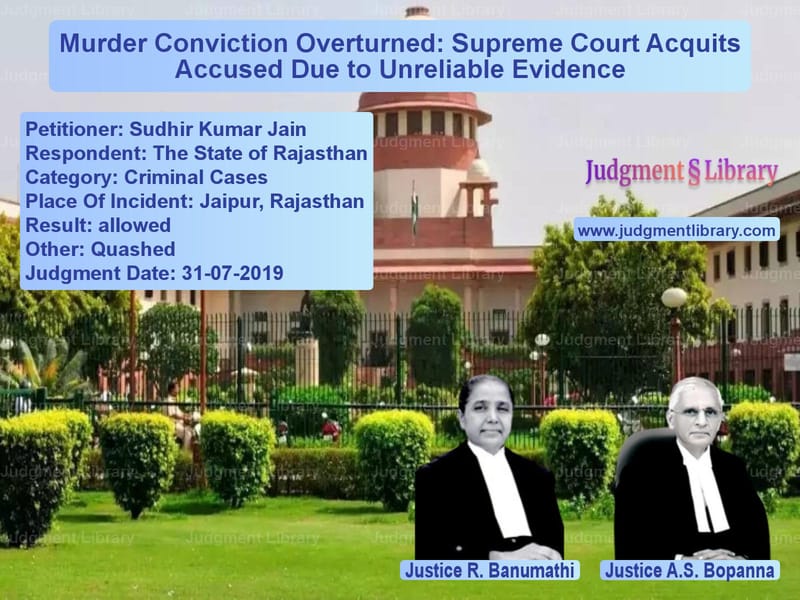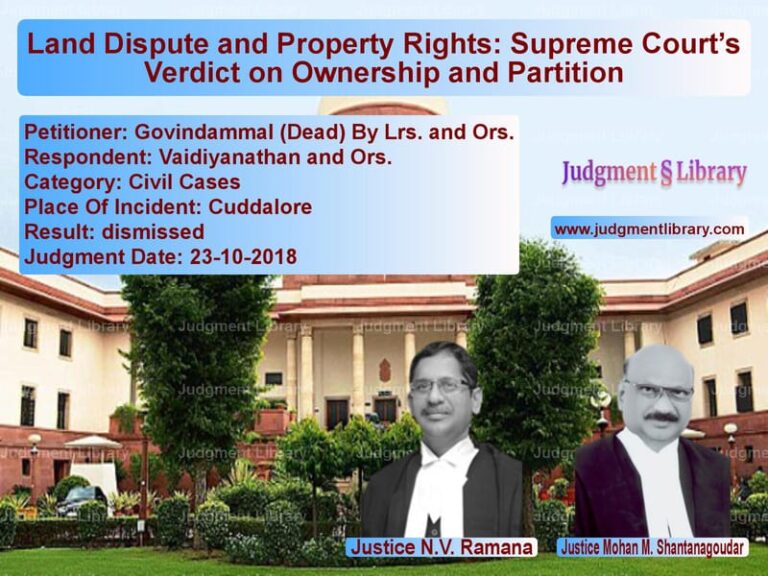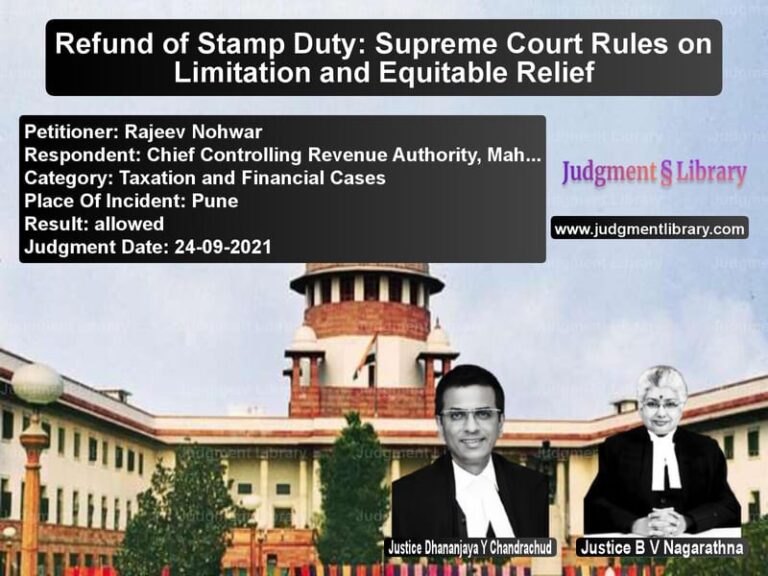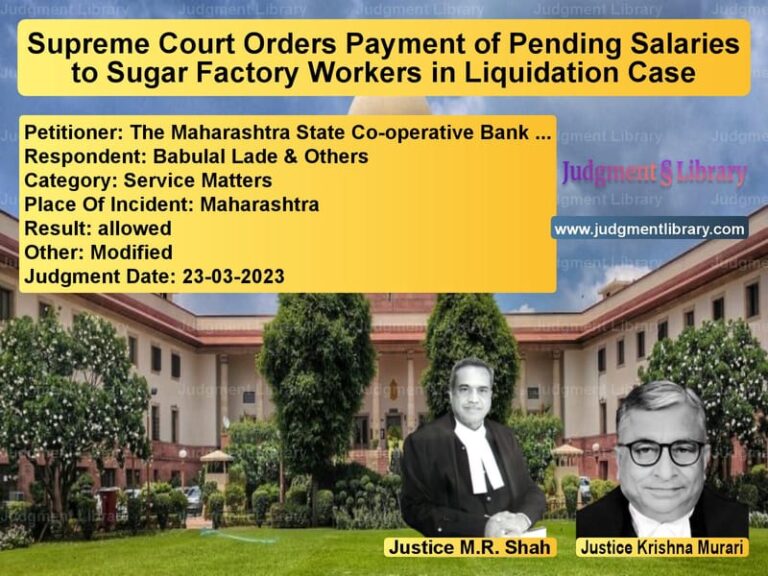Murder Conviction Overturned: Supreme Court Acquits Accused Due to Unreliable Evidence
The case of Sudhir Kumar Jain v. The State of Rajasthan revolves around the murder of a man named Rajendra Sahu and the conviction of the accused based on circumstantial evidence. The Supreme Court overturned the conviction, emphasizing that the prosecution failed to establish the guilt of the accused beyond a reasonable doubt.
Background of the Case
The case arose from a fatal shooting incident on April 17, 2003, in Jaipur, Rajasthan. The victim, Rajendra Sahu, was sitting in his auto-rickshaw when a Maruti 800 car approached. One of the car’s occupants signaled him to come closer, and when he did, the accused allegedly fired a shot at him, causing severe injuries. The injured victim was taken to the hospital, where he provided a dying declaration (parcha bayan), which led to the registration of an FIR under Section 307 IPC. After the victim succumbed to his injuries, the case was altered to Section 302 IPC (murder).
Key Facts
- The incident occurred near Baheti Hospital, where the deceased was stationed with his auto-rickshaw.
- Multiple eyewitnesses, including Farooq (PW-17), Dilip Kumar (PW-9), Shambhu (PW-2), and Iqbal (PW-4), initially claimed to have seen the crime but later turned hostile.
- The prosecution relied on the dying declaration of the victim and the testimony of a police constable, Suresh Kumar (PW-18), who claimed to have traveled with the accused.
- The trial court convicted the accused under Section 302 IPC and Section 3/25 of the Arms Act, sentencing him to life imprisonment.
- The Rajasthan High Court upheld the conviction, leading the accused to appeal before the Supreme Court.
Arguments of the Parties
Petitioner’s (Sudhir Kumar Jain’s) Argument
- The conviction was based on circumstantial evidence, as no eyewitnesses testified against the accused.
- The dying declaration did not name the accused, making it unreliable.
- The key prosecution witnesses, including PW-18 Constable, gave statements after significant delays, raising doubts about their credibility.
- The firearm allegedly recovered from the accused was not in working condition, casting doubt on the prosecution’s claim.
Respondent’s (State of Rajasthan’s) Argument
- The dying declaration was recorded when the victim was conscious and is a vital piece of evidence.
- The accused was identified by PW-18, who was traveling with the accused and heard the gunshot.
- The recovery of the weapon from the accused confirmed his involvement in the crime.
- Even though witnesses turned hostile, the dying declaration and forensic evidence were sufficient to uphold the conviction.
Supreme Court’s Analysis
Reliability of the Dying Declaration
The Court noted that the victim’s statement did not name the accused:
“In the parcha bayan, the deceased described the incident but failed to identify the shooter. This omission significantly weakens the prosecution’s case.”
The Court ruled that an unnamed dying declaration could not be the sole basis for conviction.
Witnesses Turning Hostile
The Court pointed out that all key eyewitnesses, PW-17, PW-9, PW-2, and PW-4, turned hostile and refused to support the prosecution’s version:
“When all the prosecution witnesses have turned hostile, reliance on circumstantial evidence alone does not satisfy the burden of proof beyond reasonable doubt.”
Credibility of PW-18 Constable
PW-18, a police constable, claimed to have traveled with the accused before the shooting. However, the Court found multiple inconsistencies:
- His statement was recorded 18 days after the incident.
- Despite allegedly witnessing a murder, he did not report the crime immediately.
- He claimed to have heard the gunshot but did not see who fired it.
“The delayed statement and lack of direct witnessing of the crime reduce the probative value of PW-18’s testimony.”
Recovery of the Weapon
The prosecution claimed that a 12-bore country-made pistol was recovered from the accused. However, forensic analysis (Ballistic Report, Ex.P-37) revealed:
- The weapon was not in working condition due to a mechanical defect.
- The time of the last firing could not be determined.
- The forensic expert stated that the recovered lead pellets could have been fired from the weapon, but this was not conclusive.
“The recovery of a non-functional weapon does not substantiate the prosecution’s case.”
Vehicle Recovery
The prosecution presented the recovery of a Maruti 800 car allegedly used in the crime. However:
- The ownership of the car was not proven to be linked to the accused.
- The car’s presence near the accused’s house alone was insufficient to establish guilt.
“The mere recovery of a car without additional evidence does not implicate the accused.”
Final Judgment
The Supreme Court found that the prosecution failed to prove the case beyond a reasonable doubt:
“Considering the totality of the circumstances and the failure of key witnesses to support the prosecution, we hold that the appellant is entitled to acquittal.”
The Court set aside the conviction under Section 302 IPC and Section 3/25 of the Arms Act and ordered the immediate release of the accused.
Significance of the Judgment
- Strengthens Fair Trial Principles: Reinforces the principle that circumstantial evidence must meet a high standard of proof.
- Limits the Use of Hostile Witnesses: Establishes that a case cannot rely solely on hostile witnesses and weak forensic evidence.
- Clarifies the Role of Dying Declarations: Confirms that unnamed dying declarations have limited evidentiary value.
- Ensures Proper Weapon Examination: Highlights that a non-functional weapon cannot be relied upon for conviction.
Conclusion
The Supreme Court’s judgment in Sudhir Kumar Jain v. State of Rajasthan serves as a crucial precedent in criminal law. The ruling ensures that convictions must be based on solid evidence rather than assumptions or procedural errors. By overturning the conviction, the Court reaffirmed the principle that justice must be served through fair trials and reliable evidence.
Petitioner Name: Sudhir Kumar Jain.Respondent Name: The State of Rajasthan.Judgment By: Justice R. Banumathi, Justice A.S. Bopanna.Place Of Incident: Jaipur, Rajasthan.Judgment Date: 31-07-2019.
Don’t miss out on the full details! Download the complete judgment in PDF format below and gain valuable insights instantly!
Download Judgment: Sudhir Kumar Jain vs The State of Rajasth Supreme Court of India Judgment Dated 31-07-2019.pdf
Direct Downlaod Judgment: Direct downlaod this Judgment
See all petitions in Murder Cases
See all petitions in Bail and Anticipatory Bail
See all petitions in Judgment by R. Banumathi
See all petitions in Judgment by A. S. Bopanna
See all petitions in allowed
See all petitions in Quashed
See all petitions in supreme court of India judgments July 2019
See all petitions in 2019 judgments
See all posts in Criminal Cases Category
See all allowed petitions in Criminal Cases Category
See all Dismissed petitions in Criminal Cases Category
See all partially allowed petitions in Criminal Cases Category







